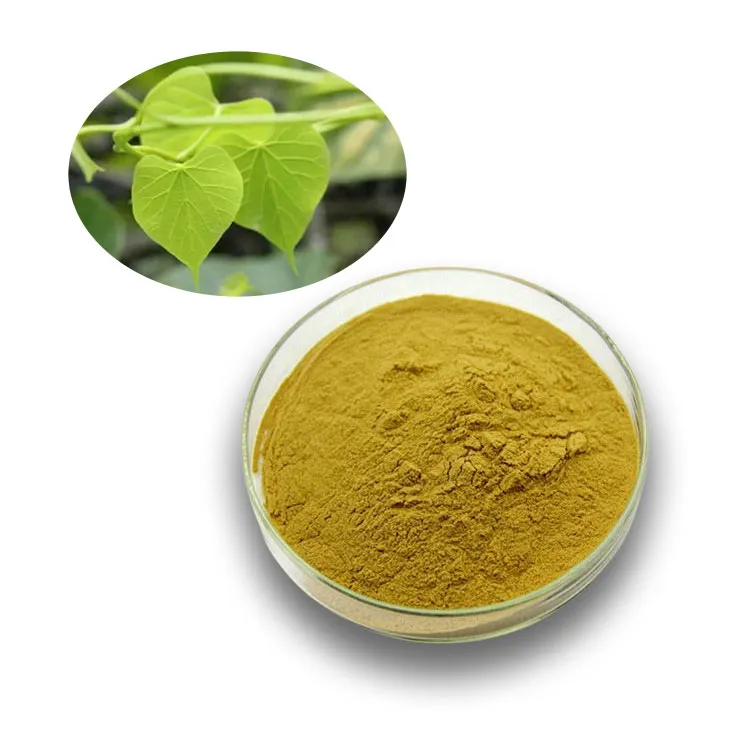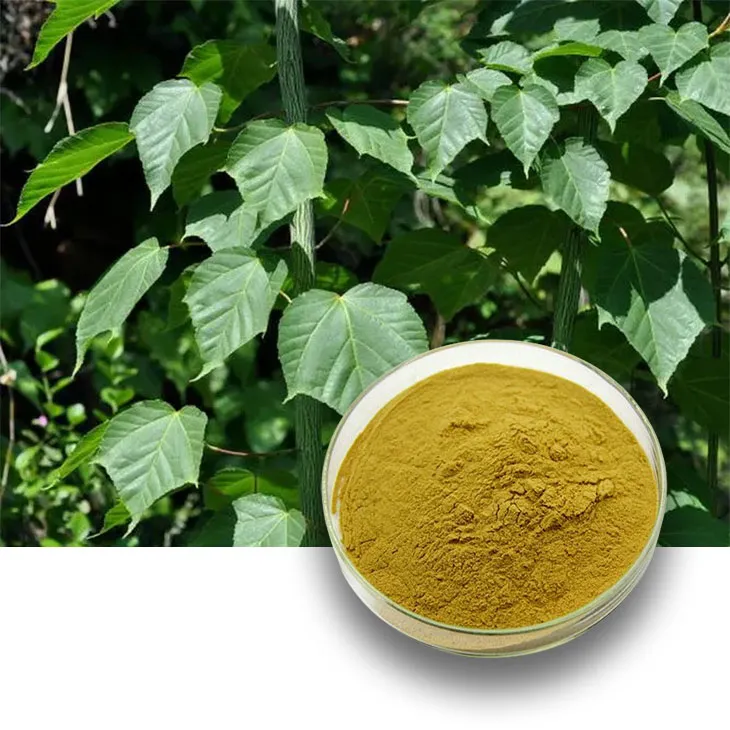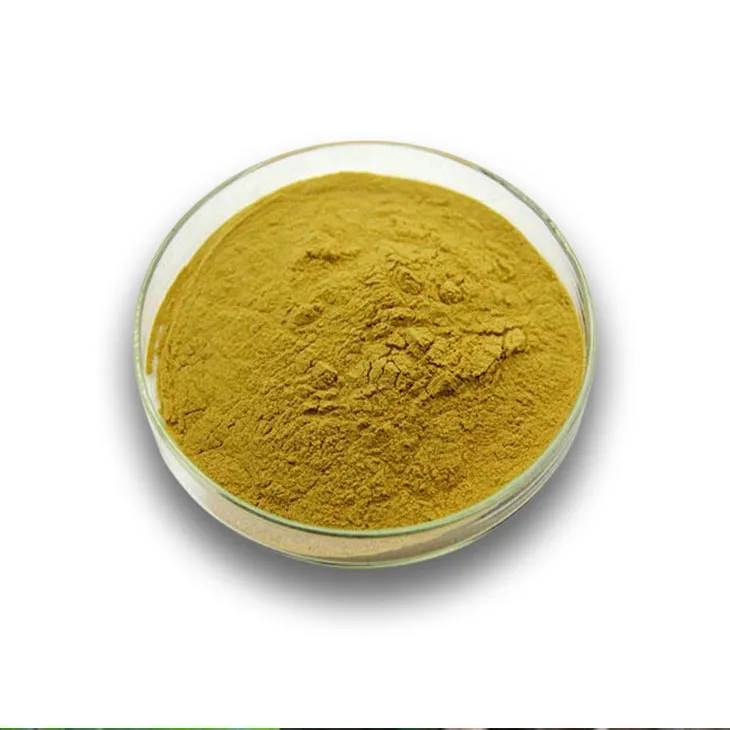- 0086-571-85302990
- sales@greenskybio.com
Purchase Tinospora cordifolia extract in batches in an economical and efficient manner.
2024-12-14

Introduction
Tinospora cordifolia extract has been gaining increasing popularity in various industries, such as the pharmaceutical, nutraceutical, and cosmetic industries. For many enterprises, purchasing this extract in bulk in a cost - effective manner is not only a matter of cost control but also a key factor in ensuring the quality and competitiveness of their products. This article will explore several strategies and considerations for achieving economical and efficient batch purchases of Tinospora cordifolia extract.

Market Research: The Foundation of Economical Purchasing
Domestic Suppliers
When it comes to finding reliable domestic suppliers, there are several aspects to consider. First, look into the reputation of the suppliers in the industry. A well - established supplier with a good track record is more likely to provide consistent - quality Tinospora cordifolia extract. You can check industry reviews, ask for references from other companies in the same field, or consult industry associations.
Second, evaluate their production capacity. Suppliers with larger production capacities may be able to offer more competitive prices, especially for large - volume orders. However, it is also important to ensure that their production processes meet quality standards and regulatory requirements.
Finally, consider their location. A closer - located supplier may reduce transportation costs and lead times, which can also contribute to cost savings and more efficient supply chain management.
International Suppliers
Expanding the search to international suppliers can also bring certain advantages. On one hand, some regions may have a natural advantage in growing Tinospora cordifolia, resulting in potentially lower raw material costs. For example, countries with suitable climates and rich soil conditions may be able to produce high - quality raw materials at a lower cost.
On the other hand, international competition can force suppliers to offer more competitive prices and better services. However, dealing with international suppliers also comes with challenges, such as different regulatory environments, longer lead times, and potential currency exchange rate fluctuations.
When considering international suppliers, it is essential to thoroughly research their compliance with international quality standards, such as Good Manufacturing Practice (GMP) and relevant phytosanitary regulations. Additionally, understanding the import - export procedures, tariffs, and customs requirements of both the source and destination countries is crucial to avoid unexpected costs and delays.

Quality - Price Balance: A Delicate yet Crucial Consideration
The balance between quality and price is a key factor in cost - effective purchasing. On the quality side, Tinospora cordifolia extract should meet certain purity levels, be free from contaminants, and possess the desired bioactive compounds. Low - quality extracts may not only affect the efficacy of the final product but also pose potential risks to consumers.
When evaluating price, it is not just about the unit price of the extract. Hidden costs, such as transportation, storage, and potential quality - related losses, should also be taken into account. For example, a seemingly cheaper extract may turn out to be more expensive in the long run if it has a shorter shelf - life or requires special storage conditions.
One way to assess the quality - price balance is to conduct comparative analyses. Compare different suppliers' products in terms of quality parameters (such as purity, potency, and composition) and price. This can be done through laboratory testing of samples obtained from different suppliers or by relying on third - party quality certifications.
Another approach is to consider the long - term value of the extract. A slightly higher - priced extract with superior quality may result in a better - quality final product, which can enhance brand reputation and customer loyalty in the long term. Therefore, it is important to view the quality - price relationship from a holistic perspective rather than simply focusing on short - term cost savings.

Negotiating Discounts Based on Purchase Scale
For enterprises planning to purchase Tinospora cordifolia extract in batches, the purchase scale can be a powerful bargaining chip in negotiating discounts with suppliers. First, clearly define your expected purchase volume over a specific period. This gives suppliers an understanding of the potential business opportunity and allows them to calculate the economies of scale they can achieve.
When negotiating, present your purchase plan in a structured and detailed manner. Highlight the long - term nature of the relationship if possible. For example, if you plan to be a regular customer with increasing purchase volumes over time, suppliers may be more inclined to offer more favorable discounts.
In addition to volume - based discounts, explore other types of incentives that suppliers can offer. This could include free samples of related products, preferential payment terms (such as extended credit periods), or value - added services like customized packaging or technical support.
However, it is important to note that while aiming for discounts, do not sacrifice quality. Ensure that any price reductions are not accompanied by a decline in the quality of the extract. A thorough understanding of the cost structure of suppliers can also help in more effective negotiations. For example, if you know that a supplier has significant cost savings potential in a certain area (such as raw material procurement or production efficiency), you can target those areas in the negotiation to achieve a win - win situation.

Monitoring Industry Trends and Policies
Staying informed about industry trends and policies is essential for cost - effective purchasing of Tinospora cordifolia extract. Industry trends can have a significant impact on the price and availability of the extract. For example, if there is an increasing demand for natural products in the market, the price of Tinospora cordifolia extract may rise due to higher competition for raw materials.
New research findings on the health benefits of Tinospora cordifolia can also influence the market. If a new study reveals additional therapeutic properties of the extract, it may lead to increased demand and potentially higher prices. Keeping track of such trends allows enterprises to anticipate price changes and adjust their purchasing strategies accordingly.
Regarding policies, regulatory changes can affect the production, import, and export of Tinospora cordifolia extract. For instance, changes in environmental regulations may impact the cultivation methods of Tinospora cordifolia, which in turn can affect the cost of raw materials. Similarly, changes in import/export tariffs or phytosanitary requirements can add to the cost of international sourcing.
Enterprises should closely monitor government announcements, industry publications, and regulatory agency websites to stay updated on relevant policies. This information can be used to make informed decisions about supplier selection, purchase timing, and inventory management.
Establishing Long - Term Cooperative Relationships with Suppliers
Establishing long - term cooperative relationships with suppliers can bring numerous benefits for cost - effective purchasing of Tinospora cordifolia extract. First, it can lead to more stable pricing. Suppliers are more likely to offer favorable prices to long - term customers as they value the consistent business. This stability helps enterprises in budget planning and cost control.
Second, long - term relationships often result in better communication and cooperation. Suppliers can provide early warnings about potential supply shortages, quality issues, or price changes. This enables enterprises to take proactive measures to mitigate risks. For example, if a supplier anticipates a shortage of Tinospora cordifolia raw materials due to adverse weather conditions, they can inform the enterprise in advance, allowing the enterprise to adjust its production plans or seek alternative sources.
Furthermore, long - term cooperation can encourage suppliers to invest in quality improvement and innovation. Since they have a stable customer base, they may be more willing to allocate resources to enhance the quality of their Tinospora cordifolia extract, develop new extraction methods, or improve production efficiency. This can ultimately benefit the enterprise through access to higher - quality products and potentially lower costs in the long run.
To build a long - term relationship, it is important to maintain open and honest communication with suppliers. Pay invoices on time, provide feedback on product quality, and work together to resolve any issues that may arise. Additionally, consider joint initiatives such as co - marketing or research and development projects to strengthen the bond between the enterprise and the supplier.
Conclusion
Purchasing Tinospora cordifolia extract in batches in an economical and efficient manner requires a comprehensive approach. Through extensive market research, careful consideration of the quality - price balance, effective negotiation of discounts, monitoring of industry trends and policies, and establishment of long - term supplier relationships, enterprises can optimize their purchasing process and achieve cost savings while ensuring the quality of the extract for their products. Each of these aspects is interrelated and should be given due attention in the overall purchasing strategy.
FAQ:
Q1: How can one find reliable suppliers for Tinospora cordifolia extract?
One can start by conducting extensive market research. Utilize online platforms, industry directories, and trade shows. Seek referrals from other enterprises in the same field. Check for supplier reviews and testimonials. Also, verify their certifications and compliance with relevant regulations both domestically and internationally.
Q2: What factors should be considered when balancing quality and price?
When considering quality, look at the purity of the Tinospora cordifolia extract, its manufacturing process, and any quality control measures in place. For price, compare quotes from different suppliers. However, don't sacrifice quality for a lower price. Consider the long - term benefits of a high - quality product, such as fewer production issues downstream. Analyze the cost - effectiveness in terms of the overall value the product will bring to your enterprise.
Q3: How can one negotiate a discount based on the purchase scale?
Firstly, clearly define your purchase scale and present it to the supplier. Highlight the potential for a long - term business relationship. Demonstrate your market knowledge and the prices offered by competitors. Be prepared to compromise on certain terms, such as delivery schedules or payment terms, in exchange for a better price. Build a strong case for why you deserve a discount based on the volume you are purchasing.
Q4: Why is it important to keep an eye on industry trends and policies?
Industry trends can impact the availability and price of Tinospora cordifolia extract. For example, if there is a growing demand in the market, prices may increase. Policies, such as import/export regulations, environmental regulations, and quality standards, can also affect the purchase process. By staying informed, you can anticipate changes, adjust your purchasing strategy accordingly, and avoid potential legal or financial risks.
Q5: What are the benefits of establishing a long - term cooperative relationship with suppliers?
A long - term relationship can lead to more favorable terms, such as better prices, priority in case of product shortages, and improved customer service. Suppliers are more likely to invest in quality improvements and innovation when they have a stable long - term customer. It also reduces the time and effort spent on searching for new suppliers and building new relationships.
Related literature
- Studies on the Pharmacological Properties of Tinospora cordifolia Extract"
- "Optimizing the Supply Chain for Botanical Extracts: A Case of Tinospora cordifolia"
- "Quality Control in the Production of Tinospora cordifolia Extract"
- ▶ Hesperidin
- ▶ citrus bioflavonoids
- ▶ plant extract
- ▶ lycopene
- ▶ Diosmin
- ▶ Grape seed extract
- ▶ Sea buckthorn Juice Powder
- ▶ Beetroot powder
- ▶ Hops Extract
- ▶ Artichoke Extract
- ▶ Reishi mushroom extract
- ▶ Astaxanthin
- ▶ Green Tea Extract
- ▶ Curcumin Extract
- ▶ Horse Chestnut Extract
- ▶ Other Problems
- ▶ Boswellia Serrata Extract
- ▶ Resveratrol Extract
- ▶ Marigold Extract
- ▶ Grape Leaf Extract
- ▶ blog3
- ▶ blog4
- ▶ blog5
-
Pure 85% Tomentil Extract.
2024-12-14
-
Beetroot juice Powder
2024-12-14
-
Medicinal Marshmallow Extract
2024-12-14
-
Quercetin
2024-12-14
-
Diosmin
2024-12-14
-
Epimedium extract powder
2024-12-14
-
Thunder God Vine Extract
2024-12-14
-
Red Vine Extract
2024-12-14
-
Carrageenan Extract Powder
2024-12-14
-
Jujube Extract
2024-12-14
-
Mulberry Extract
2024-12-14





















